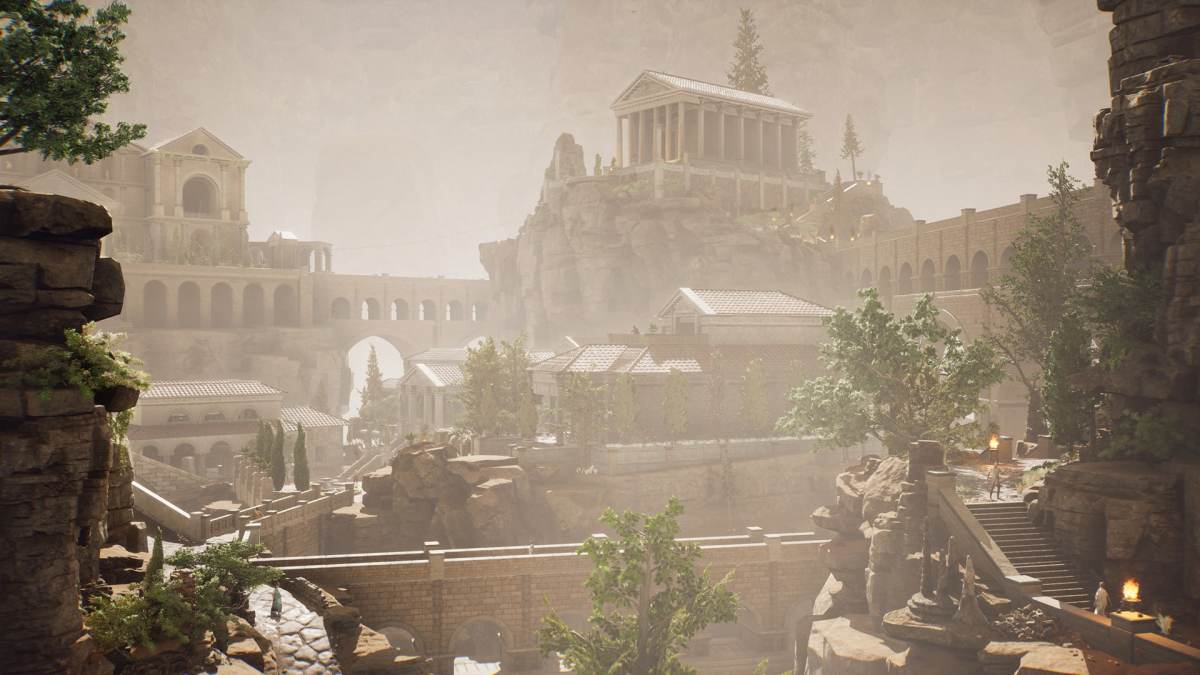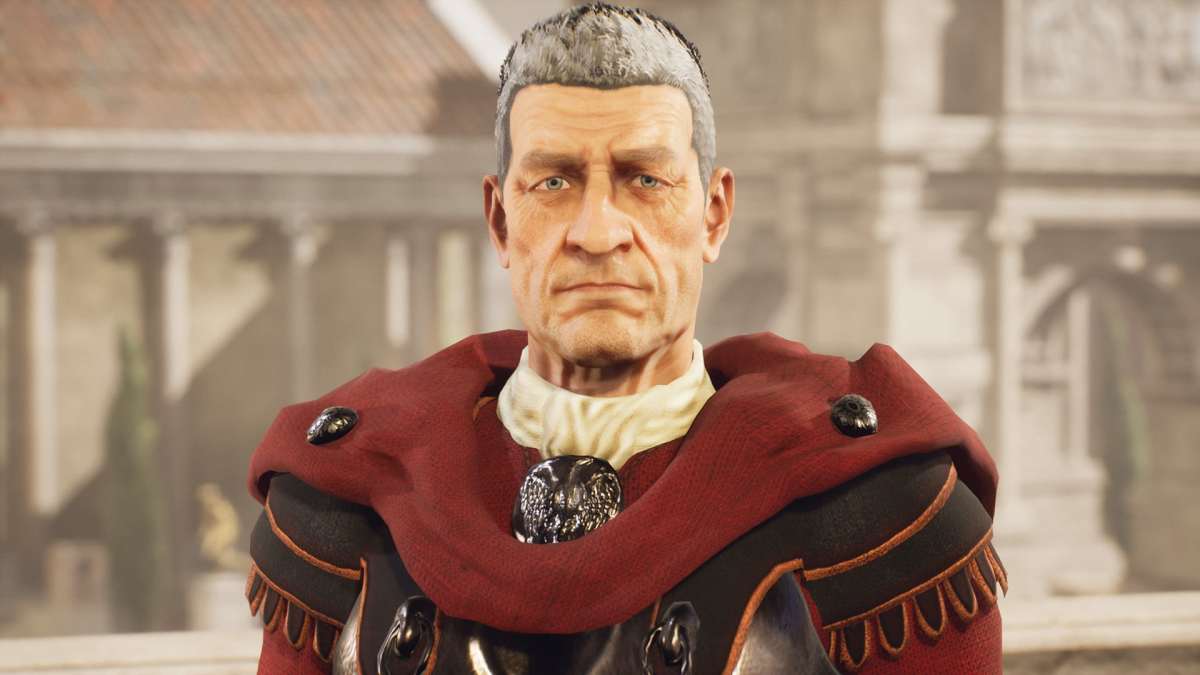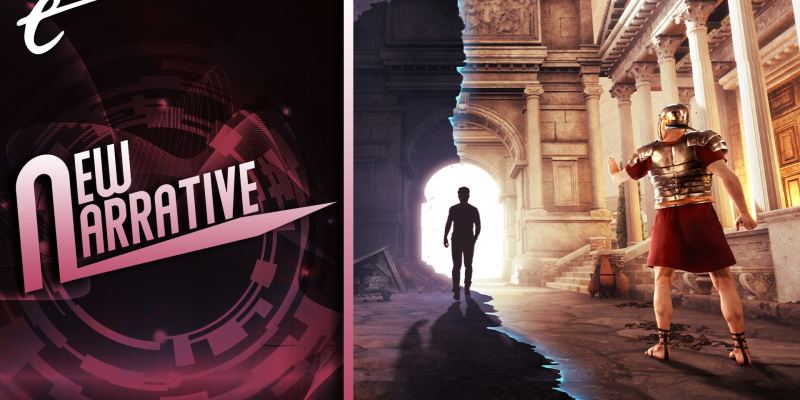The Forgotten City plays like elaborate clockwork: Perform an action or make a dialogue choice and watch the roughly two dozen citizens trapped in the titular Roman settlement respond accordingly, shifting their positions relative to you and to each other to reveal new dialogue options, items, and locations. And when the time loop you are stuck in inevitably restarts, you bring your knowledge and your inventory with you, creating opportunities to sequence events in a different order on your gradual way to one of four endings.
It’s a game that relies less on action (although there are weapons and several opportunities to use them) than it does on exploration, deduction, and trial and error. It is, in many ways, an old school point-and-click adventure in first-person guise, complete with a few progress conditions that are perhaps a little too obscure, but elevated by its clever writing, excellent atmosphere, and sense of mystery.
So it’s fitting that The Forgotten City is also crammed with philosophical and historical ideas, themes, and questions. Are people fundamentally good? Is there a single correct morality system, or should we adopt value pluralism or perhaps even moral relativism? Is building on the foundations of older civilizations a natural part of progress, or does it amount to cultural appropriation? In fact, there are so many ideas that my notes for this roughly 8-hour adventure ran to several times the length of this column. So here I will focus on just three concepts that are central to the game: the Golden Rule, natural law theories, and the time paradox.

The Golden Rule is one of the oldest and most universal ethical beliefs, although there are multiple formulations with different implications. The Forgotten City itself notes several versions. Ulpius quotes the Jewish thinker Hillel the Elder: “What is hateful to you, do not do to another.” This is a negative formulation; it does not oblige anyone to act, but only to refrain from acting in a particular way. Georgius cites another negative formulation of the Rule, this one due to the Greek philosopher Thales: “Avoid doing what you would blame others for doing.” Meanwhile Khabash gives a positive formulation, which he attributes to the Egyptian goddess Ma’at: “Do to the doer to make him do” (although it is disputed whether the Golden Rule dates as far back as ancient Egypt). Or, in the Biblical formulation: “Do to others what you want them to do to you.” The formulation is positive in the sense that it obliges someone to act in a particular way, rather than simply to refrain from acting.
The key premise of The Forgotten City is that the player and all of the NPCs are governed by the Golden Rule, which the game formulates as, “The many shall suffer for the sins of the one.” In practice this means that if anyone in the city commits a sinful act, every single person is hunted down for it. This includes the player, unless they can make their way to a portal, which sends them back in time to start a new time loop.
This commandment is fascinating for its brutality, inspired by the Roman military practice of decimation. It applies equally in the positive and negative sense: You should act without sin and you should refrain from sin. Indeed, it may even be that certain failures to act are sinful in themselves. The explicit threat of punishment – “the many shall suffer” – works to make The Forgotten City into a surveillance state. The city becomes a kind of antiquity-era panopticon, where the mere threat of being observed committing a sinful act is enough to prevent that act. And it explicitly introduces the theoretically loaded term “sin” into the formulation of the rule.

The term is loaded because the concept of sin has no universally agreed basis. What is considered sinful varies by time and culture, a fact that The Forgotten City recognizes in several dialogue interactions (perhaps the most enjoyable of which is a Socractic debate with a hermit philosopher, whom I suspect to be Diogenes). It links naturally to the second big theme of the game, namely the idea of natural law.
Natural law theories come in a variety of sophisticated versions, but at their core they are all concerned with the question of what gives law its authority. Put more crudely: Why should someone follow the law they are subject to? One simple answer to this question might be that legal values derive their authority from moral values. We should follow the law against killing, for example, because it is wrong to kill. In opposition to natural law theories is a thesis known as legal positivism, which treats law and morality as separate. Legal positivists point out that laws are often exploited by evil regimes to support their view.
Both of these positions are implicitly at play in The Forgotten City. For example, in an effort to avoid ambiguity around the definition of sin, the city’s magistrate enforces Roman law. Early on in the game he explains that this is because he believes Roman law to be the highest expression of morality. In response, the player can draw on a number of counter-examples: Roman law permitted the ownership of slaves and did not allow women to vote, for example.
If all else fails, the player can deliberately break the Golden Rule to travel back in time and start a new time loop. The game makes it clear from the start that the way to break out of the time loop is to cause a version of what is commonly known as the grandfather paradox. What’s at stake here is well known from pop culture classics like The Terminator and Back to the Future. If time travel were possible, I could go back in time and kill my grandfather before my mother or father was conceived, thereby rendering my existence impossible, but in that case I would not be around to go back in time to kill my grandfather – a paradox.

Some have been convinced by the paradox that time travel is impossible, while others have attempted various responses to it. One popular response, which the philosopher David Lewis elaborated upon from science fiction literature, is just to say that there is always something that gets in the way of the paradox arising. I could go back in time and try to kill my grandfather, but something would always get in the way – say, a weapon malfunction or a last-moment rescue.
What’s striking about The Forgotten City is that it goes in the opposite direction and embraces the paradox. Not only is there nothing to prevent the paradox, but you are forced to cause it to break the time loop you are in. When the paradox does occur, it flings you back into your ordinary timeline, as if the universe adjusts itself to ensure that it contains no inconsistencies.
The Forgotten City is by no means the first game to tackle complex philosophical ideas, but it stands out for the depth, breadth, and subtlety with which it approaches a lot of its subject matter. It does not try to compete with the likes of Planescape: Torment or Disco Elysium for the quality of its prose or depth of characterization, but it does not have to. Its strength lies in the ideas that it is able to set to work in your head, like an extension of its clockwork design, long after you are done playing.
